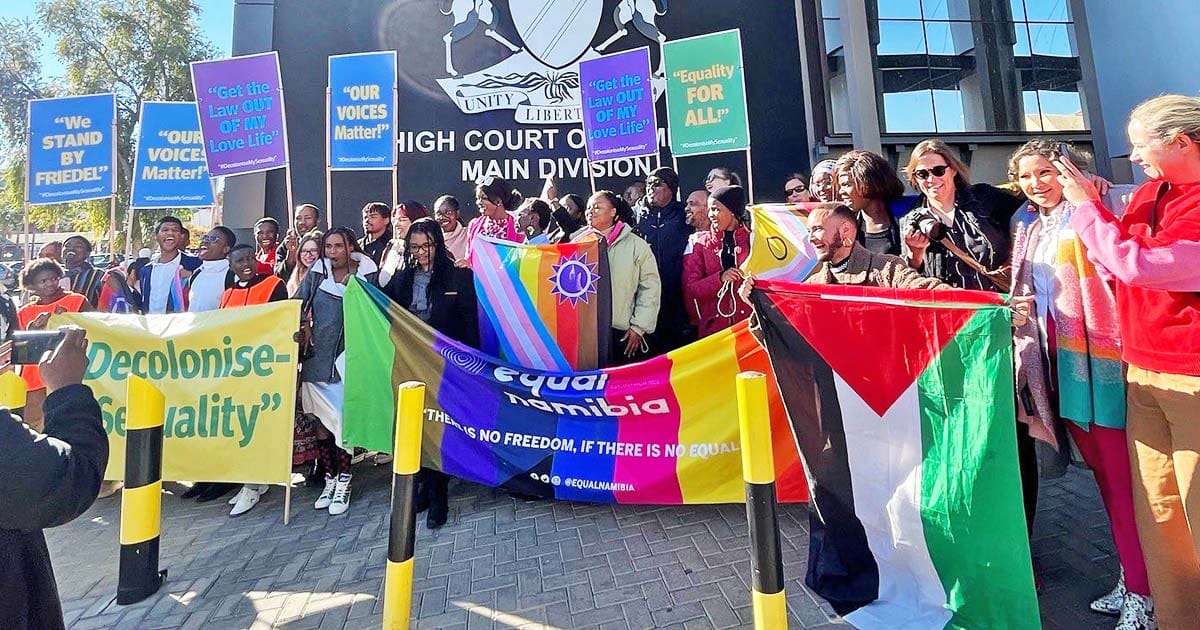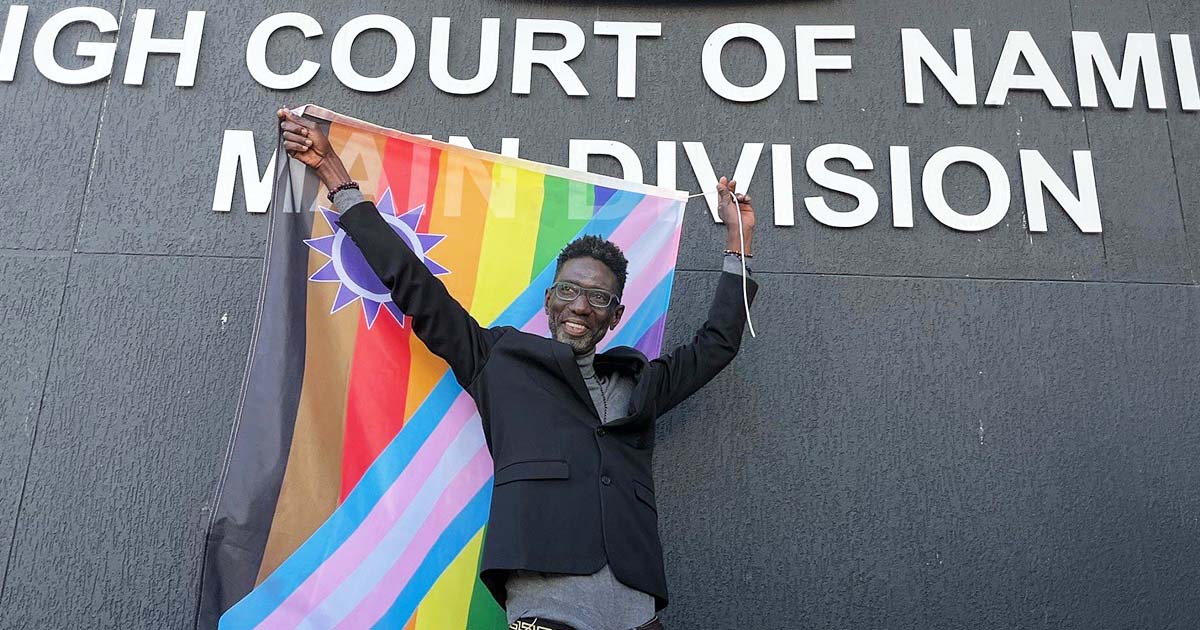Jubilation as Namibia High Court Decriminalises Same-Sex Love

Members of the LGBTIQ+ community and allies gathered outside the Namibia High Court on Friday morning awaiting the ruling (Photos: Equal Namibia)
In a landmark human rights victory in Namibia, the High Court in Windhoek has declared that the country’s ban on same-sex intimacy is unconstitutional and invalid.
The three-judge bench held that “the enforcement of the private moral views of a section of the community (even if they form the majority of that community), which are based to a large extent on nothing more than prejudice” is not justifiable.
They also stated that criminalising gay men “poses a greater threat to the fabric of society as a whole than tolerance.”
Members of the LGBTIQ+ community and allies outside the court on Friday morning responded with jubilation at the long-anticipated verdict in the case brought by HIV and LGBTIQ+ rights activist Friedel Dausab. He argued that the colonial-era laws violated his rights under Namibia’s Constitution and contravened international human rights law.
The case was filed in the High Court of Namibia in June 2022, with the court hearing arguments in October 2023.
“I challenged these laws as a committed activist because I was personally and acutely aware that criminalisation was a clear obstacle to my living a full, open, honest life. I can also attest that the sodomy offences hindered the prevention of HIV infections and access to life-saving treatment, and made gay men like me easy targets for abuse,” said Dausab.
“But most of all, because of this decision, I no longer feel like a criminal on the run in my own country simply because of who I am. Just like most ordinary Namibians, I’ve always wanted the chance to find love and to know that I belong. Today, I feel closer to that goal,” he added.
Activists documented at least 64 arrests reported by police between 2003 and 2019 under the anti-gay laws, although none of these cases were ultimately prosecuted by the authorities. This criminalisation nonetheless fuelled a climate of fear, marginalisation, stigma, and discrimination against the LGBTIQ+ community.

Activist Friedel Dausab celebrates the court’s repeal of the anti-gay laws outside the High Court in Namibia on Friday (Photo: Equal Namibia)
A New Dawn for Queer Namibians
LGBTQIA+ activist Omar van Reenen told the Namibian that the ruling represents a “new dawn” and a “message of hope” for queer Namibians. “To every queer Namibian out there, you are deserving of every chance and opportunity in this country to pursue and achieve your dreams and destiny,” they exclaimed.
Human Dignity Trust, which supported Dausab’s case, described the ruling as “historic” and said it will ensure better protection for LGBTIQ+ Namibians.
“I am delighted that Friedel has succeeded in his case against the government of Namibia and proud that our team at the Trust has played a part in his journey to justice,” commented Téa Braun, Chief Executive of The Human Dignity Trust.
“These combined and concerted efforts not only mean that LGBT Namibians can look to a brighter future where their rights to love freely are recognised, but also bring much needed and renewed energy to other decriminalisation efforts across Africa,” added Braun.
UNAIDS also applauded the judgment. “This decision by the High Court of Namibia is a powerful step towards a more inclusive Namibia,” said Anne Githuku-Shongwe, UNAIDS Regional Director for East and Southern Africa.
“The colonial-era common law that criminalised same-sex sexual relations perpetuated an environment of discrimination and fear, often hindering access to essential healthcare services for LGBTQ+ individuals.”
Amnesty International’s Deputy Regional Director for East and Southern Africa, Khanyo Farise, said the ruling was “a victory for love, for equality and for human rights.” Farise added: “This ruling is a step toward ending discrimination in equal access to health care and other social services and ensuring that all people in Namibia can choose their partners without fear of reprisals and live their lives in dignity.”
Religious and Political Leaders Must Respect Ruling
The ruling is likely to be met with outrage by religious leaders and conservative politicians. A May 2023 ruling by the country’s Supreme Court ordering the state to recognise same-sex marriages concluded abroad sparked a huge queerphobic response in the country, leading to a series of protests.
In September 2023, lawmakers passed a bill to annul the Supreme Court’s ruling and explicitly ban any same-sex marriages in Namibia. This was followed by the murder of at least six queer individuals, often under brutal circumstances. The bill has yet to be signed into law by President Mbumba, with activists urging him to exercise his presidential veto powers.
Addressing the potential for backlash against the ruling, van Reenen called on political and religious leaders to “respect the rule of law and respect the hard fought freedoms which our liberators fought for.”
Namibia is now aligned with the majority of countries in the Southern African Development Community (SADC), where more than half of member states have decriminalised same-sex sexual activity, such as Angola, Botswana, Lesotho, Mauritius, Mozambique, Seychelles, and South Africa.
🚨BREAKING🚨: The High Court of Namibia has declared the apartheid-era Sodomy Law unconstitutional and should be repealed.
Welcome to a new Namibia. A born-free Namibia. #TogetherWeCan pic.twitter.com/0HYycTDEde
— Equal Namibia (@EqualNamibia) June 21, 2024
Leave a Reply